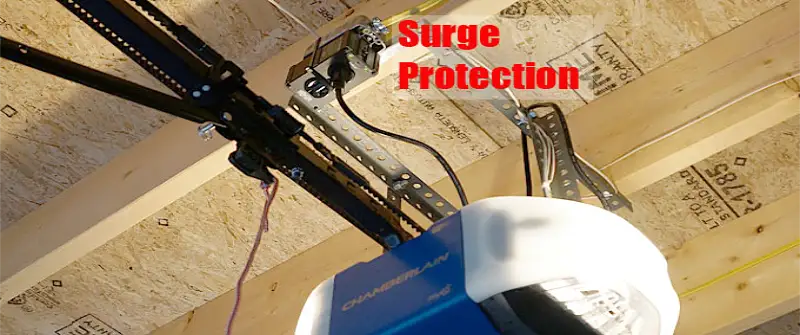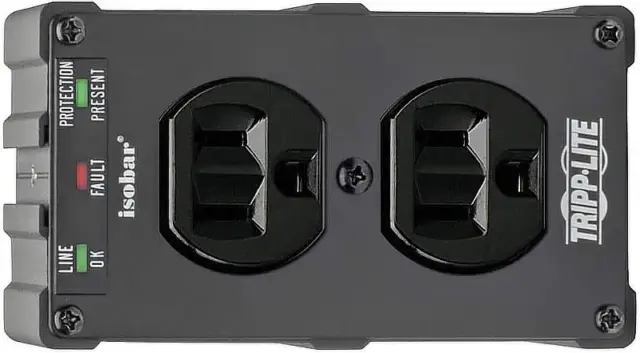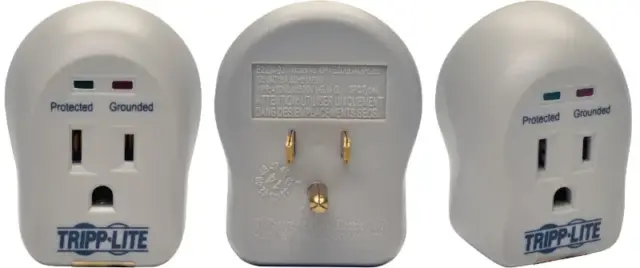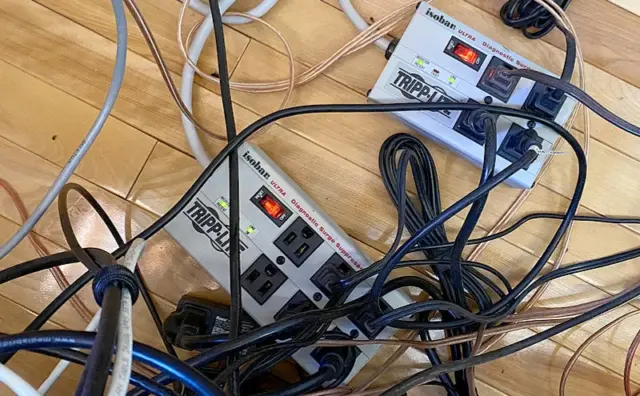Best Surge Protector For My Garage Door Opener and Electronics

I needed a good surge protector for my garage door opener. When I built my garage, I installed a garage door opener with a DC motor (nice and quiet!). It also has WiFi built in, and obviously electronic circuits that should be protected from potential power surges. I did some research while looking for the best protection, and found the perfect one (pictured above, and linked below).
Update: As one would expect, the best surge protector costs more. But the same company also has a lesser expensive model which I trust to be quite adequate for most. I’ve just added it below.
> jump down this page to best (costs more)
> jump down this page to next best
I also use this same brand surge protector for my other electronic equipment in the house. I’m confident that it’s among the best for the consumer market.
Surge Protector For Garage Door Opener
Modern garage door openers have built-in electronics. Even a microprocessor for some ‘fancy’ features… Part of the “internet of things” (IoT) these days. These circuits really should be protected.
Tripp Lite 2-Outlet is perfect for Garage Door Openers
(This is the best surge protector, in my opinion, for this use)
The following product is the Tripp Lite model that I use for my garage door opener. The two outlet protector plugs straight in to an existing outlet. I know that I only need one outlet, but the specs on this model are quite good.
Do you live in a lightning prone region? I would kick in the extra bucks for the higher rating of this one versus some others.
Since the outlet is mounted on the ceiling I used a zip-tie to secure it (although it was holding perfectly well by itself, and didn’t really need one). You can see it installed in the photo above.
1410 joules protection rating
Tripp Lite Isobar 2 Outlets
(view on amzn)

I want to share with you what I have determined to be a very high quality choice for effective surge protection. It’s not the cheap built-in surge protector that you might find in your typical ‘power strip’ (although some of those are good – depending)… Instead, it’s a purpose-built commercial grade surge protector, specifically designed just for that purpose.
I have been using this brand for years, and I can attest to the fact that my various electronic equipment have not blown up since I’ve installed these – through the fiercest of thunderstorms! Though with a ‘direct hit’, all bets are off..
(video when lightning zapped my internet router)
Best Single Outlet Surge Protector For Garage Door Opener
660 joule protection rating
Tripp Lite 1 Outlet
(amzn)

Tripp Lite isobar Ultra – Surge Protector:
4 Outlet
(Tripp LIte on amzn)
Here’s a picture of the mess of cables behind my ‘entertainment center’, all plugged in to various Tripp Lite isobar surge protectors.

Why This Surge Protector is a Great Choice
While you can certainly pay more for a surge protector, this one is THE most well reviewed and fits a reasonable price point. The main selling point for me was their extreme confidence to include insurance refund if equipment gets damaged!
Here are some technical specifications sourced directly from Tripp Lite for their isobar ultra.
Note that each model has their own specifications. The following is for the 4-outlet surge protectors shown above. I use them around the house for various electronics.
– Lifetime Limited Warranty and $50,000 Ultimate Lifetime Insurance covers any connected equipment damaged by a power surge. Yes, you read that right.
– 3330-joule surge suppression rating (135,000 Amps!). Reduces 6,000-volt test surges to harmless levels under 35 volts.
– 3 built-in isolated filter banks, large toroidal chokes, ferrite rod-core inductors, HF/VHF capacitors and multiple layers of metal oxide varistors to block interference.
– Removes EMI/RFI interference up to 80 db.
– AC Suppression response time less than 1 nanosecond!
– 12 Amp resettable circuit breaker.
– Diagnostic LED’s indicate it’s present state.
– Metal housing, can also be mounted to wall.
– Right angle plug keeps it tidy.
Surge Protection for Valuable Electronic Equipment
I currently use several of the Tripp Lite isobar Ultra’s.
- My Starlink Internet equipment and WiFi Routers
- TV’s / Roku media player / DVD player / AV receiver
- Garage door opener (it has a microprocessor board in it)
- Office Computers and equipment, NAS device, Printer
- Washing Machine & Dryer (electronics inside)
- Dishwasher (electronics inside)
The list could be long, given that nearly everything these days has electronics inside.
If the electronic equipment is worth more than the surge protector, especially if it’s worth a lot more, I would consider getting a surge protector. There are lots out there, and Tripp Lite (no affiliation) is a very good brand choice.
